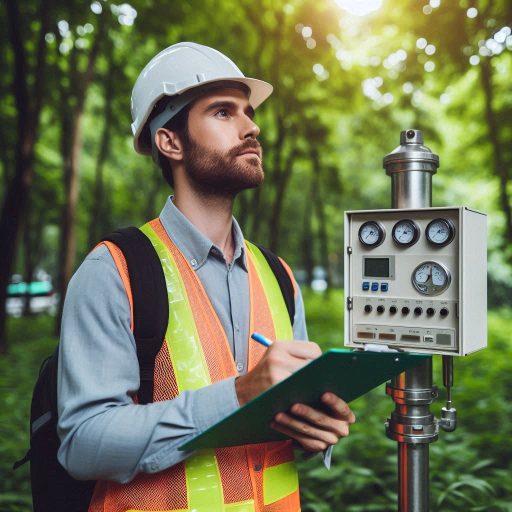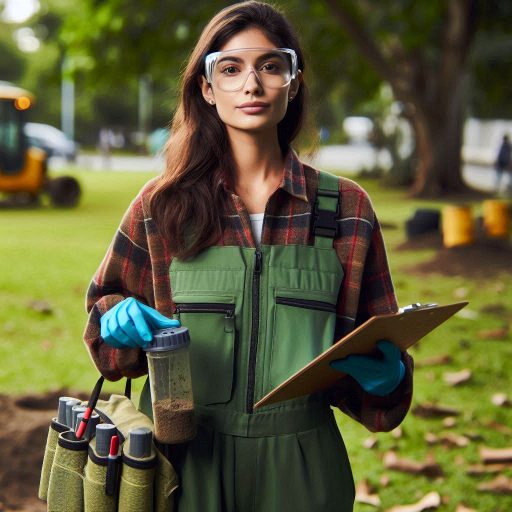Introduction
Environmental technicians play a crucial role in ensuring environmental compliance as environmental Technician Contribution to Compliance
They monitor air, water, and soil quality to ensure that businesses and organizations adhere to environmental regulations.
By collecting samples, conducting tests, and analyzing data, they identify potential environmental hazards and ensure compliance with local, state, and federal laws.
Their work helps prevent pollution, protect natural resources, and promote public health.
Compliance is essential in environmental protection because it ensures that organizations meet legal standards designed to safeguard the environment.
Without strict adherence to these regulations, pollution could increase, leading to significant environmental damage and health risks.
Environmental technicians ensure that businesses operate within these legal boundaries, thereby minimizing their environmental impact.
Environmental compliance also helps organizations avoid legal penalties and reputational damage.
Technicians’ work in monitoring and reporting helps companies maintain their licenses to operate and build trust with regulators and the public.
By identifying potential violations early, technicians enable timely corrective actions, reducing the risk of severe environmental harm.
This blog post will explore how environmental technicians contribute to compliance efforts.
It will cover their role in monitoring environmental conditions, the importance of accurate data collection, and how their work supports sustainable business practices.
Responsibilities of an Environmental Technician
Monitoring and Sampling Air, Water, and Soil Quality
Environmental technicians play a crucial role in ensuring compliance with environmental regulations.
They begin by monitoring and sampling air, water, and soil quality.
This task involves collecting samples from various locations to assess environmental conditions.
Technicians use specialized equipment to measure pollutant levels in these elements, providing critical data on environmental health.
Air quality monitoring is particularly important in areas prone to industrial pollution.
Technicians measure levels of harmful substances like carbon monoxide and sulfur dioxide.
This data helps identify pollution sources and assess the effectiveness of emission control measures.
Similarly, water quality sampling is vital for maintaining safe drinking water and protecting aquatic ecosystems.
Environmental technicians test water for contaminants, such as heavy metals, pesticides, and bacteria.
This testing ensures that water bodies comply with environmental standards, safeguarding public health and biodiversity.
Soil quality monitoring is another key responsibility.
Technicians analyze soil samples to detect contamination from hazardous substances.
This information is crucial for identifying polluted sites, guiding remediation efforts, and ensuring that soil is safe for agriculture and development.
Conducting Inspections and Audits
Environmental technicians also conduct inspections and audits to ensure compliance with environmental regulations.
These inspections involve visiting industrial sites, waste management facilities, and other operations that impact the environment.
Technicians assess whether these sites adhere to regulatory standards, checking for proper waste disposal, emission controls, and pollution prevention measures.
Audits are comprehensive reviews of an organization’s environmental practices.
Technicians examine records, procedures, and operational processes to identify compliance gaps.
They may also interview staff and observe operations to ensure that environmental practices align with legal requirements.
Conducting these audits helps organizations avoid fines, penalties, and reputational damage associated with non-compliance.
Through these inspections and audits, technicians play a vital role in enforcing environmental laws.
Their work ensures that industries and businesses operate within legal limits, reducing environmental harm and promoting sustainable practices.
Analyzing Data and Preparing Reports
After collecting samples and conducting inspections, environmental technicians analyze the data they have gathered.
Data analysis involves interpreting the results of air, water, and soil tests to determine pollution levels and trends.
Technicians use this information to assess environmental health and identify areas that need attention.
Once the analysis is complete, technicians prepare detailed reports on their findings.
These reports include data summaries, interpretations, and recommendations for corrective actions.
The reports are often submitted to regulatory agencies, businesses, or environmental organizations.
Preparing accurate reports is essential for ensuring compliance with environmental regulations.
The findings guide decision-makers in implementing necessary changes to meet legal standards.
These reports also serve as documentation of an organization’s environmental performance, demonstrating their commitment to sustainability and regulatory compliance.
Read: Online Courses for Surveying and Mapping Technicians
Importance of Compliance for Environmental Protection
Ensuring Environmental Responsibility
Environmental technicians play a vital role in ensuring that businesses and industries operate in an environmentally responsible manner.
They monitor and enforce compliance with environmental regulations, guiding companies to adhere to legal standards.
Through regular inspections, they identify potential environmental risks and recommend corrective actions.
This proactive approach helps businesses minimize their environmental footprint and avoid legal penalties.
By ensuring compliance, environmental technicians foster a culture of responsibility and sustainability within organizations.
Preventing Pollution and Resource Degradation
Environmental technicians actively work to prevent pollution and the degradation of natural resources.
They conduct environmental assessments to identify sources of pollution and implement measures to control them.
Technicians monitor air, water, and soil quality, ensuring that pollutants remain within safe limits.
They also design and oversee waste management programs that promote recycling and reduce landfill use.
By managing hazardous materials and emissions, technicians help prevent contamination and protect natural ecosystems.
Their efforts preserve vital resources for future generations.
Protecting Human Health and Wildlife
Protecting human health and wildlife from harmful environmental impacts is a key responsibility of environmental technicians.
They assess the potential risks of environmental hazards on public health and wildlife populations.
Technicians monitor exposure to harmful substances and work to reduce their impact.
By ensuring that companies comply with safety regulations, they help prevent incidents of pollution that could harm humans and animals.
Environmental technicians also participate in cleanup efforts for contaminated sites, restoring habitats and safeguarding biodiversity.
Their work is crucial in maintaining a healthy environment for all living beings.
Read: Surveying and Mapping Technician: Job Satisfaction
Contribution of Environmental Technicians to Compliance
Identifying violations and recommending corrective actions
Environmental Technicians play a crucial role in identifying violations of environmental regulations within organizations.
They conduct thorough inspections and assessments to identify areas where organizations are not in compliance with the applicable laws and regulations.
Upon identifying violations, Environmental Technicians recommend corrective actions to bring organizations back into compliance.
This could involve recommending changes to processes, implementing new technologies, or conducting regular monitoring to ensure ongoing compliance.
Assisting in the development and implementation of environmental management plans
Environmental Technicians contribute to compliance by assisting organizations in the development and implementation of environmental management plans.
These plans outline the steps organizations will take to ensure compliance with environmental regulations.
Environmental Technicians help organizations identify potential environmental risks, develop strategies to mitigate these risks, and create monitoring programs to track progress.
By assisting in the development and implementation of these plans, Environmental Technicians help organizations proactively address compliance issues.
Providing training and guidance to organizations on compliance procedures
One of the key contributions of Environmental Technicians to compliance is providing training and guidance to organizations on compliance procedures.
Environmental Technicians help organizations understand the requirements of environmental regulations, as well as the steps needed to comply with these regulations.
They provide training to employees on proper waste management practices, pollution prevention strategies, and other compliance-related topics.
By providing this training and guidance, Environmental Technicians empower organizations to meet their compliance obligations effectively.
Read: Networking Tips for Surveying and Mapping Professionals

Case Studies on Environmental Technicians’ Impact on Compliance
Success Stories
Environmental technicians played a crucial role in a chemical plant’s compliance success.
Their monitoring and reporting ensured adherence to strict regulations, preventing environmental harm.
In another instance, a waste management facility faced closure due to repeated violations.
Environmental technicians implemented new procedures, trainings, and audits to ensure compliance.
Through their dedication, the facility managed to achieve and maintain compliance, avoiding closure.
The technicians’ attention to detail and expertise were key to the facility’s turnaround.
Positive Environmental Outcomes
An environmental technician’s diligence in monitoring air quality led to the reduction of harmful emissions.
Their efforts resulted in improved air quality for the surrounding community, enhancing public health.
In a water treatment plant, technicians identified and addressed a contamination issue promptly.
Their quick response prevented a potential health crisis and protected the local ecosystem.
By consistently monitoring and analyzing data, technicians have been instrumental in identifying trends.
Their proactive approach has led to early detection of issues and timely implementation of corrective actions.
Improved Public Health
In a case study involving a hospital, environmental technicians implemented strict waste management protocols.
Their measures minimized the risk of infections and improved overall sanitation, benefiting patients and staff.
At a construction site, technicians ensured compliance with noise and dust regulations.
Their efforts reduced health risks for workers and nearby residents, enhancing the overall quality of life.
Through their expertise, environmental technicians have made significant contributions to public health and safety.
Their work plays a crucial role in maintaining compliance with regulations and safeguarding our environment.
Environmental technicians play a pivotal role in ensuring compliance and promoting positive environmental outcomes.
Their diligent monitoring, proactive measures, and expertise have led to success stories and improved public health in various industries.
By highlighting their impact through case studies, we can appreciate the vital contributions of environmental technicians in building a sustainable future.
Challenges Faced by Environmental Technicians in Ensuring Compliance
Dealing with Non-Compliant Organizations and Individuals
Environmental technicians play a critical role in addressing non-compliance with environmental regulations.
They often encounter organizations or individuals that fail to meet required standards.
When dealing with non-compliance, technicians must identify violations and take appropriate actions.
This involves conducting thorough inspections and gathering evidence to support enforcement efforts.
Effective communication is key when addressing non-compliance.
Technicians must clearly explain the nature of the violations and the necessary corrective actions.
They often serve as liaisons between regulatory agencies and the offending parties, ensuring that compliance requirements are understood and implemented.
In cases of persistent non-compliance, technicians may escalate the issue to higher authorities.
This might involve recommending fines, penalties, or other enforcement measures.
Their goal is to ensure that all parties adhere to environmental regulations to protect public health and the environment.
Navigating Complex and Ever-Changing Environmental Regulations
Environmental regulations are often complex and subject to frequent changes.
Technicians must stay informed about the latest laws and guidelines to ensure compliance.
This requires continuous education and training to understand new regulations and how they apply to different industries.
Technicians must be adept at interpreting regulatory language.
They need to assess how new rules impact their work and the organizations they monitor.
This involves reviewing regulatory updates, attending workshops, and consulting with legal experts when necessary.
Staying current with regulations also involves monitoring updates from government agencies.
Technicians must track changes and adapt their practices accordingly.
Their ability to navigate these complexities ensures that organizations remain in compliance and avoid costly penalties.
Overcoming Resource Constraints and Budget Limitations
Resource constraints and budget limitations present significant challenges for environmental technicians.
Despite these obstacles, they must ensure that compliance efforts remain effective.
Technicians often work with limited resources, including personnel, equipment, and funding.
To overcome these challenges, technicians must prioritize their tasks and allocate resources efficiently.
They may need to focus on high-risk areas or violations that pose the greatest threat to public health or the environment.
Effective time management and resource allocation are essential to maximizing their impact.
Technicians can also leverage technology to compensate for limited resources.
Advanced monitoring tools, data analysis software, and automation can improve efficiency and reduce costs.
These tools help technicians gather accurate data and streamline compliance processes.
Collaboration is another key strategy for overcoming resource constraints.
Technicians often work with other departments, agencies, or organizations to share resources and expertise.
This cooperative approach helps them achieve compliance goals despite budgetary limitations.
Read: Impact of Drones on Surveying and Mapping
Transform Your Career Today
Unlock a personalized career strategy that drives real results. Get tailored advice and a roadmap designed just for you.
Start NowSee Related Content: Automotive Engineering Specializations Explained
Strategies for Enhancing Compliance through Environmental Technician’s Work
Collaborating with Regulatory Agencies and Stakeholders
Environmental technicians play a crucial role in ensuring compliance by collaborating with regulatory agencies and other stakeholders.
These partnerships help technicians stay informed about current regulations and guidelines.
By working closely with agencies, technicians can provide accurate data that supports compliance with environmental laws.
Engaging with stakeholders, including businesses, community groups, and government entities, enhances the effectiveness of environmental programs.
Collaboration fosters transparency and trust, which are essential for successful compliance efforts.
When stakeholders are involved, it ensures that environmental practices align with community needs and regulatory requirements.
Regular communication with regulatory agencies helps in identifying potential compliance issues early.
This proactive approach enables technicians to address concerns before they escalate into violations.
By maintaining strong relationships with regulators, environmental technicians can navigate complex legal frameworks more effectively.
Utilizing Advanced Technologies for Accurate Monitoring and Analysis
Advanced technologies significantly enhance the accuracy and efficiency of environmental monitoring and analysis.
Environmental technicians use tools like remote sensors, drones, and GIS systems to collect and analyze data.
These technologies provide real-time information, allowing for more precise monitoring of environmental conditions.
Remote sensing technologies enable technicians to monitor large areas without the need for extensive fieldwork.
This capability is particularly useful for tracking changes in air quality, water levels, and vegetation over time.
The data collected through these technologies support compliance by providing detailed evidence of environmental conditions.
Drones offer high-resolution imagery and access to difficult-to-reach areas.
Technicians can use drones to inspect sites, monitor pollution sources, and assess ecological impacts.
This technology reduces the time and cost associated with traditional monitoring methods, while also improving data accuracy.
Geographic Information Systems (GIS) integrate various data sources into a comprehensive platform for spatial analysis.
Technicians use GIS to map pollution levels, track environmental changes, and identify potential compliance issues.
The ability to visualize data in maps enhances decision-making and supports effective environmental management.
Providing Ongoing Training and Professional Development
Ongoing training and professional development are essential for environmental technicians to maintain compliance standards.
Regular training ensures that technicians stay updated on the latest regulations, technologies, and best practices.
This knowledge is crucial for accurately assessing compliance and implementing effective environmental strategies.
Professional development opportunities, such as workshops, webinars, and certification programs, help technicians enhance their skills and expertise.
Training in new technologies and methods enables technicians to perform their duties more effectively.
By investing in continuous learning, technicians remain capable of addressing emerging environmental challenges.
Training also promotes a culture of compliance within organizations.
When technicians are well-trained, they can identify potential risks and take corrective actions promptly.
This proactive approach reduces the likelihood of non-compliance and enhances overall environmental performance.
Gain More Insights: How to Choose the Right Aerospace Engineering Program
Future Trends in Environmental Compliance and the Role of Technicians
Emphasis on Sustainability and Green Practices
Industries today place a strong emphasis on sustainability and green practices.
Companies are increasingly prioritizing environmental responsibility in their operations.
Environmental technicians are essential in implementing these sustainability initiatives.
They ensure that industries adhere to regulations and adopt eco-friendly practices.
Their work helps companies minimize their environmental impact while maintaining compliance with legal standards.
By monitoring emissions, waste, and resource use, technicians play a critical role in promoting sustainability.
Increasing Use of Data Analytics and Automation
Data analytics and automation are transforming compliance monitoring.
Environmental technicians now use advanced tools to collect and analyze environmental data.
These technologies enable more accurate and efficient monitoring of compliance metrics.
Automation reduces human error and increases the speed of data processing.
Technicians can quickly identify potential compliance issues and take corrective actions.
This technological shift also allows for real-time monitoring, making compliance efforts more proactive and effective.
Growing Demand for Skilled Environmental Technicians
The demand for skilled environmental technicians is growing across various sectors.
Industries are expanding their sustainability programs, leading to an increased need for technical expertise.
Technicians with experience in data analytics and automation are particularly valuable.
Their ability to integrate technology with environmental practices makes them indispensable to organizations.
As more companies focus on green initiatives, the role of environmental technicians continues to expand.
See Related Content: Geological Technician Career Prospects in the USA
Conclusion
Compliance is vital in environmental protection, ensuring that laws and regulations safeguard our natural resources.
Environmental technicians play a crucial role in maintaining this compliance.
They monitor, assess, and report on environmental conditions, ensuring adherence to regulations that prevent pollution and protect ecosystems.
Technicians‘ work helps organizations avoid fines, legal issues, and environmental damage.
Their expertise ensures that operations align with environmental standards, contributing to a healthier planet.
Recognizing and supporting environmental technicians is essential for continued success in protecting our environment.
Their efforts deserve acknowledgment and ongoing support to maintain and enhance compliance.
Let‘s continue to value their contributions, ensuring that they have the resources and recognition needed to uphold environmental standards.




